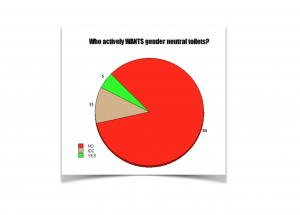
Who actually WANTS ‘gender neutral’ toilets?
In the first few months after Twitter added the ‘poll’ option for its users back in 2015, over 1.7 billion votes were cast. The online poll is a data gathering research tool previous generations could never have dreamed of. A poll held in August this year asking ‘Which is better, cats or dogs?’ got over 6,500 votes and came to the rather surprising conclusion that nearly three quarters of participants preferred dogs to cats.
I was so surprised by this that I checked elsewhere. Research by Sainsbury’s came up with exactly the same answer – 74%. Madness. I suspect that more research is needed. But enough of our four-legged friends. I am easily distracted from the issue in hand.
In researching my last article Unisex Toilets and Sexual Violence in Schools, I came across several cases where parents had been horrified when their kids were suddenly expected to use gender neutral loos in school. Some had even taken their child out of school in protest. It seemed that while there were some people- mostly men- who didn’t mind the idea of gender neutral toilets, there didn’t seem to be too many people who actually, actively wanted them.
One such is transactivist and advocate for abolition of the Obscene Publications Act, Jane Fae, who enthused in Gay Star News last year, “Typically any introduction of a gender-neutral bathroom would be met with applause.”
Why on earth would anyone want to applaud a gender-neutral toilet? You might want to rethink that, M. Fae. In my younger days, I nipped into the Ladies’ loos in a club or bar on numerous occasions if a guy was bothering me or seemed creepy. If he could have followed me in, I certainly wouldn’t have been applauding. I know I’m not alone in feeling this. There have been quite a few online polls done on the subject of how people feel about unisex toilets and the general consensus is ‘computer says no’.
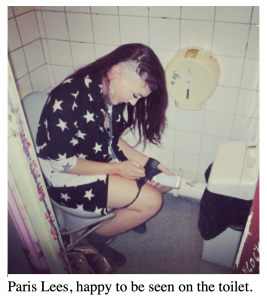 Paris Lees and other high profile trans-activists have also spoken about the joy of the gender neutral loo, claiming that women’s safety is in no way compromised by the presence of be-penised persons.
Paris Lees and other high profile trans-activists have also spoken about the joy of the gender neutral loo, claiming that women’s safety is in no way compromised by the presence of be-penised persons.
“Whatever the law is, people of all genders can still be dicks to you in public places,” says Shon Faye. Of course, a logical conclusion from that argument would be, ‘do away with all laws because people will commit crimes anyway.’
Faye goes on to add that the idea that he should use the men’s toilets “seems both ludicrous and terrifying”, ignoring the obvious reason that this is because there are men in there.
“If (there is) proof that gender-neutral toilets put women at risk, I’m all ears. If not, I’m rather bored by people… whipping up unnecessary panic.” said Lees in 2017, claiming that fears about gender-neutral toilets were ‘all in the mind’.
Well, Paris, a recent Freedom of Information request by the Sunday Times showed that a huge 90% of sexual assaults in changing rooms took place in ‘gender neutral’ areas. Listening now? No. I didn’t think so.
 Of 134 complaints in 2017-2018, 120 reported incidents happened in unisex changing rooms. Not necessarily toilets per se, but areas where women are in a state of undress and that are traditionally single-sex.
Of 134 complaints in 2017-2018, 120 reported incidents happened in unisex changing rooms. Not necessarily toilets per se, but areas where women are in a state of undress and that are traditionally single-sex.
Ninety percent! Women are clearly more vulnerable when men are present.
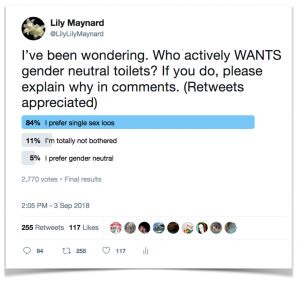
So from 3rd-5th September 2018 I ran a three-day Twitter poll of my own, which captured a modest 2,770 votes. And here’s the result:
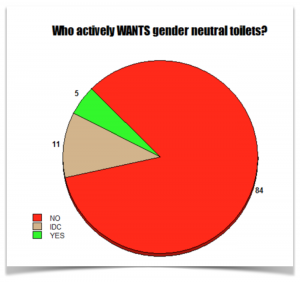
84% of respondents said no.
11% weren’t bothered.
Just 5% preferred the idea.
Of course, one of the problems facing the Twitter poll is sampling frame. While in theory you have all of Twitter, it’s naturally your own- usually like-minded- followers who are most likely to see, and vote in, your poll.
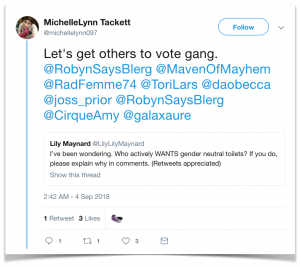 I tried to partly redress this balance by asking people to retweet; wording the poll to appeal specifically to those who might actively want gender neutral bathrooms, and only asking those who favoured them to give their reasons for the preference. My poll was shared 255 times and although I have no way of tracking who shared it with whom, I do know it also reached the trans community: for example Michelle, ‘a loveable trans woman who loves God,’- who later that week DMd me to call me a ‘pathetic vile bigot’- shared the poll with his followers, although with limited success.
I tried to partly redress this balance by asking people to retweet; wording the poll to appeal specifically to those who might actively want gender neutral bathrooms, and only asking those who favoured them to give their reasons for the preference. My poll was shared 255 times and although I have no way of tracking who shared it with whom, I do know it also reached the trans community: for example Michelle, ‘a loveable trans woman who loves God,’- who later that week DMd me to call me a ‘pathetic vile bigot’- shared the poll with his followers, although with limited success.
So my poll is what it is. It’s a Twitter poll. I don’t offer it up as a highly researched, peer reviewed study, although there are people determined to find reasons to scoff at even those. Thanks to the wonders of the internet, however, we can look at other polls with similar wording and compare results. This should give a much bigger sample, although of course it will still not be indicative of the entire population.
My father remains unimpressed, musing, “An online poll just tells you what people who like answering online polls think.” Thanks, dad.
In a recent debate prompted by a row over new ‘gender neutral’ toilets at the Barbican Centre in London, the show Loose Women discussed unisex toilets.
“A unisex toilet! The stench, the filth and all the men,” started Christine Blakely, calling the women’s toilets, “a little sanctuary for a few moments.”
“We go in there to get away from men. It’s a safe place,” said Nadia Sawalha, adding, “I don’t want to send my daughter off to the loo in a restaurant not knowing whether there’s any strange men in there or not.”
The opinions of actual women mean very little to Penis Pink News, who ran a feature criticising the show, declaring triumphantly, ‘What about your toilets at home?’ and citing unisex toilets in small facilities like aeroplanes and cafes as already gender neutral. The absurdity of this argument, of course, is that we know who uses our toilets at home, and the tiny, wash basin-inclusive individual toilet of your local bijou cafe is a far cry from a communal public toilet block.
The article in Penis Pink News concluded with a feat of spectacular mansplaining from Benjamin Butterworth, who claimed: ‘Loose Women really doesn’t understand.”
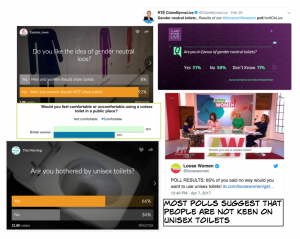
After the show, Loose Women ran a poll asking viewers if they would be happy to use unisex toilets. 65% replied that ‘no way!’ would they use them.
Checking with other polls and surveys, it seems that Loose Women understands the situation very well. I’m not alone with finding unenthusiastic results. When Channel 4 unveiled its new gender neutral (GN) toilets ‘4everyone’, women were not impressed, leading the Express newspaper to run its own readers’ poll in which a whopping 92% of people replied that men and women should not be expected to share toilets. When Irish broadcaster Claire Byrne ran a similar poll, only 31% of respondents voted in favour of GN toilets.
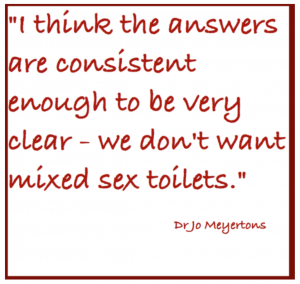 A 2013 YouGov poll suggested that only 38% of women would feel comfortable using a unisex toilet in a public place.
A 2013 YouGov poll suggested that only 38% of women would feel comfortable using a unisex toilet in a public place.
When it was reported that women at the Home Office were refusing to use the new £40,000 unisex loos, This Morning ran a poll asking, ‘Are you bothered by unisex toilets?’ and 66% of 21,000 people answered ‘yes’.
Presenter Danni Levy said “We cannot get past the fact that men have a penis and they use the toilet in a different way.”
Penis Pink News responded again, dismissing the presenters as ‘cisgender’ and quoting a random on Twitter who told the This Morning team “perhaps you all get over yourselves and grow up.” Wowzer. I bet that told them.
Outside the realms of transactivism, the lack of enthusiasm for the unisex toilet is apparent.
I think the answers are consistent enough to be very clear – we don’t want mixed sex toilets.” said Dr Jo Meyertons, going on to add, “Only trans-id males want them, and they don’t give a damn about women or girls.”
With the exception of the YouGov poll, one thing all these polls have in common is that they ask both men and women their opinions. While many men seem embarrassed or awkward in unisex facilities (I see the poor things cringe in Pret-a-Manger as they hurriedly ‘remember’ to wash their hands when they see women are present) it is women that have more to lose. Men are far more likely to be unconcerned by sharing facilities. One woman responding to my poll commented:
“The survey isn’t restricted to women and it should be. Because women are at risk of sexual assault in bathrooms, not men, which is the main reason we don’t want gender neutral bathrooms.”
A male respondent answered the question, ‘Who actually wants gender neutral toilets?’ with:
“If I was a woman, the answer would be ‘definitely not’. Because I have daughters and a wife the answer is ‘definitely not’. If I had nobody else to worry about, my answer would be ‘not bothered’. That’s because men don’t generally have to worry about being attacked by women.”
One thing I noticed coming up frequently among those who supported the idea of GN toilets was the hope or presumption that unisex bathrooms would include private wash basins, be pristine, spacious, well-designed and luxurious. Well, I think we’d all like pristine public toilets. This, of course, will not always be the case.
Two ideas were put forward that struck me as important. The first was that unisex toilets would make bathroom visits easier for dads out with young female children.
Interestingly that very situation arose this afternoon when I was visiting a friend whose husband was getting ready to take their eight-year-old daughter to a concert.
“What will you do if she needs the loo?” asked mum, somewhat uneasily.
“Oh, I’ll wait for her outside the Ladies,” replied dad, immediately.
While on one level this could be said to show that GN facilities are needed, on another it draws attention to how society subliminally acknowledges the predatory nature of men. It’s perfectly normal for a woman to take her eight year old son into the Ladies, but neither the child’s mum nor her dad would have been happy for their daughter to use the men’s toilet, even with her dad as protector. Dad was also aware that, even with a small child, his presence in the ladies would not be welcomed. The reason for that is core to this whole debate.
Some shopping malls and larger restaurants already provide ‘family rooms’ with space for a buggy and changing facilities, although these are often a shared space with disabled people. More of these spaces should be provided in addition to disabled toilets. By their very nature these spaces are unisex.
Likewise more public bathrooms should be available for those with larger children or adults that have special bathroom needs and their carers: the Changing Places campaign has campaigned for this with growing success. Again, by their very nature these spaces are unisex.
The above are special bathrooms, not the traditionally single-sex communal cubicle or stall toilets with a shared hand washing area that are provided by most venues. These are not the spaces that are under threat by the current trend for unisex toilets.
The other argument for unisex bathrooms is that they could result in shorter waiting times for women in crowded areas such as clubs and theatres. Of course, while this may be true on some level, women are no longer left with a space to escape from men- whether to avoid being pestered, discuss their date with friends, fix their lippy or clean up in private after a messy period. Some might say more to the point, what about urinals? Because surely even the most easy going of us doesn’t want to walk past a row of urinating blokes with their knobs out? If we get rid of the urinals it’ll take longer for blokes to go to the loo… yada yada… no time saved at all.
Nonetheless, 5% of my respondents said they liked the idea of gender neutral toilets, and a further 11% said they weren’t bothered, so let’s have a look at some of their reasons why.
Reasons for wanting, or not minding, unisex public toilets
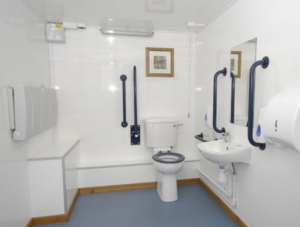
Luxury hire toilet cubicle from ‘Prestige’
If they are floor to ceiling walls/locking doors, self-contained units with sink & hand-drier, then fine…. plus noise resistant…
I personally want gender neutral ones, after having used unisex toilets, which were individual rooms like disabled toilets, in a row. A lot more private and you didn’t have to basically sit in the toilet to close the door. Also makes sense in terms of handling numbers.
Gender neutral are great when it’s a separate room with toilet and sink. Nice if you need some private time in front of the mirror/sink (e.g. to refresh armpits).
Gender neutral accessible cubicles, one user per cubicle. Everyone can use them and it evens out the queues.
I’ve just come back from Sweden and they seemed to manage fine with public unisex toilets for everyone… no mess. No drama. No stink. Individual cubicles for all though.
If its all cubicles I don’t see the harm – how many times do women use men’s toilets in pubs etc,when the ladies is full?
I like gender neutral toilets although not with urinals. The ones I’ve used have an air of civility about them which is lacking in single sex toilets. People seem to be on their best behaviour when in the company of the opposite sex.
Because I appear somewhat in the middle, and I don’t want to make anyone feel uncomfortable.
If toilets are single cubicles and secure, I’d prefer gender neutral to even up the average time spent queuing. If they’re stalls, single-sex.
All toilets should be single occupant, designed for easy access, and for both sexes.
The pub I was in suddenly had mixed loos when the gent’s malfunctioned and had to be closed. Men & women in the Ladies’… I was more apologetic than the women seemed worried. Separate cubicles, locked doors. It seemed to work.
I like them insofar it means twice the amount of toilets for me which reduces walking and waiting time. That effect only applies to old buildings though, for the future it will probably lead to less toilets and women being marginalized again (by pee on the seats etc.)
Gender neutral. No more worrying about going into the wrong bathroom accidentally, no more wasting money on two bathrooms, no more looking for the bathroom only to find there’s only a woman’s bathroom on that floor. Its just more convenient.
Personally, if I have to go, Any port in the storm will do, I’ve used public Gender Neutral Loos, they are private, and guarded. Hell, I even have one in my home. That said, I am there to focus on the task at hand.
Totally not bothered. We’ve all been using gender neutral toilets in our homes, on planes, in small restaurants and cafes, and we’ve been fine.
I’ve seen some good examples & can see the benefits for opposite sex carers including fathers of young daughters. But they must be designed as such, not cobbled together, & must guarantee privacy.
Unisex if kept clean (urinals behind privacy wall) to reduce queuing time & allow opposite sex carer/parent to accompany. Not in places where females are more vulnerable (nightclubs? schools?) unless layout rethought.
Reasons for wanting three types of toilet, female, male, gender neutral.
I’d prefer all three to be options or it to be by the public business’ choice themselves. Gov buildings should have all three though.
Definitely single sex with a third gender neutral option for those that want it.
I’d prefer to have Male only, Female only & ‘Anyone’ options. Covers all bases…
Single sex with a third option available for those who need it.
I would like three options: male, female, anyone welcome/family friendly.
There should be three rooms: male, female, whatever.
I answered single sex but I DO think single-stall gender neutral toilets are an acceptable addition to (not replacement for) single sex bathrooms.
*****
Although I only requested that people give me reasons FOR wanting gender neutral loos, it’s not surprising that many of those against the idea also shared their thoughts.
Reasons for not wanting unisex public toilets
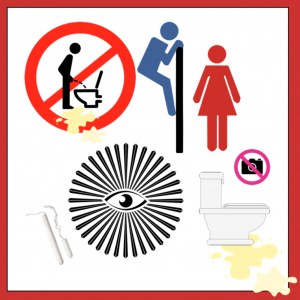 “I could foresee many instances where I’d miss there being (only) other women in that space. Tampons, escaping men in bars among the safety of other women, etc.
“I could foresee many instances where I’d miss there being (only) other women in that space. Tampons, escaping men in bars among the safety of other women, etc.
I like having a girls only space.
We had gender neutral toilets in a school where I was teaching recently… some parents of girls objected so strongly they threatened to take them out of the school.
Men’s toilets stink! Yuk I would not feel comfortable using a stall next to a man having a pee or anything else!!
I’m a bloke and I pee on the seat.. I can’t see many women liking that!!
Because men get more urine on the floor than women.
Even a 10 year old girl should not have to share a toilet with strange men with the perverts out there . What about sperm on the seat ?
Men’s loos are messy and stinky, leaving aside the obvious safeguarding issues.
I don’t even like male cleaners coming in. Vital that we retain sex segregated spaces in public.
This is probably hopelessly old-fashioned, but I’m not comfortable even having men’s and women’s toilets ADJACENT to each other. Where I live, a little girl was strangled and raped in a disabled/unisex toilet in a shopping centre while her family waited for her outside.
I for one have no desire to poop with a man in the next stall over.
Mixed sex are usually gross. Pee all over floor n seat. General feelings of discomfort and unsafe with unfamiliar male persons in that space with me. I don’t feel like I have to worry about peeping Toms either.
Used gender neutral loos last week at NT property- wee on seats and floors- horrid.
Quite apart from the safety aspect, I do not want to have to deal with loos where men have pissed on the floor and the seats. I know some women can be less than hygienic in their habits, but these are rare IME.*
* in my experience
Any space with men in it becomes “Men’s Space” so there’s no neutrality about it. Men dominate any spaces they are allowed into.
Definitely prefer single sex loos.
I think all toilets should be single sex and gender neutral – so you use the toilet for your sex regardless of what gender you identify as.
Recently an old gentleman walked into a unisex loo as I was washing my hands. The dear didn’t know where to look even though I was only washing my hands.
Single sex offers privacy, for women and men. No one wants to deal with menstruation issues next to a male, and few men are comfortable urinating in front of women. Also, men’s loos stink – urine splashed everywhere!
Last thing I want are gender neutral loos.
I had to use a ‘gender neutral’ loo once. There was nothing neutral about it. Especially not the odour. Males quite clearly dominated, and it was absolutely disgusting to use. I had to pee with my bag on my lap because there was no hook, and no way I could put it on the floor.
I’ve had two miscarriages at work. There’s a lot of blood.
The last comment, so sad, sent me in search of an article I had read about the number of women who suffer miscarriages in public. I eventually found it on the Fair Play for Women site and you can read it here. Be warned, it is deeply moving, it made me cry. It also made me angry that so many men would be so flippant about women’s need for single-sex spaces. The writer concludes:
“If the world outside the Ladies’ was fully accepting of women’s right to privacy & dignity, of our desire not to be stalked and groped, of our naturally unpolished looks and our hormonally-active bodies, then we wouldn’t need those safer spaces. As it stands, though, the world demands that we hide our ‘mess’ and has given us a small room in public places, where we’re supposed to sort ourselves out.”
One other reply that made a huge impression on me was this:
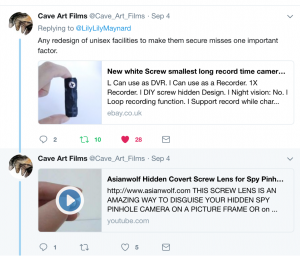
The use of SpyCams. Also known as Molka. Recently I was contacted by a woman via Twitter. She lives in Korea, where women are frequently filmed without their knowledge and the results posted on the internet, sometimes by boyfriends but often by strangers. The results can ruin women’s lives.
“I am now spreading the facts about Korea’s misogyny, especially about Molka, which means a spycam in Korea,” she wrote. “Could you please spread this so that this gets more attention please? I would be so thankful. Since this is a problem of Korea, not many people gives interest to this issue, but still I would like everyone to know this. Thank you so much.” She linked me to this thread on Twitter.
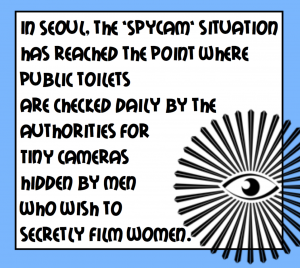 In Korea, men ‘hide cameras in their clothes or stuff’ so that they can secretly take pictures or videos of women without being noticed. The videos are uploaded to porn sites and victims have little luck getting them taken down.
In Korea, men ‘hide cameras in their clothes or stuff’ so that they can secretly take pictures or videos of women without being noticed. The videos are uploaded to porn sites and victims have little luck getting them taken down.
Journalist Raphael Rashid tweeted in June that some South Korean women are now wearing masks to hide their faces when using public toilets, so they can’t be identified.
In Seoul, the situation has reached the point where public toilets are checked daily for these cameras. In 2017 over 6,000 cases of ‘molka’ were reported- this number, of course, does not include the women too scared to report the crime, or the probably even larger numbers who never even realise they’ve been filmed. The checks seems to be vaguely ineffective, despite the huge numbers of women being filmed or photographed in states of undress without their consent, the authorities have not yet reported finding a hidden camera. One reason for this may be that in unisex toilets, a discretely held or placed phone may do the job. Cameras can be hidden in baseball caps; in shoes. In August of this year, an estimated 70,000 people, mostly women, took to the streets in protest, some wearing masks, to protest being filmed by hidden cameras, some on mobile phones, some cached by men in public toilets. Many held high banners declaring, ‘My Life is Not Your Porn’. Laws against ‘Molka’ are proving inadequate. An article in the Independent earlier this year ended with the ominous prediction. ” Activists have warned the practice is reaching epidemic levels and could spread to other countries.”
If men can wander in and out of public toilets used by women, holding phones; planting cameras, taking photos and sexual assaults will all be much easier. And before you scoff at the potential for that, remember the statistics we’ve looked at already. 90% of sexual assaults in changing rooms in this country took place in ‘gender neutral’ areas.
Think it doesn’t happen here? Here are just some of the SpyCam items available on UK Amazon and Ebay. A baseball hat with a camera in the front will cost you £55. A fake water bottle is a snip at a mere £32. You can buy a plastic coat hook with a hidden camera in it for less than £15. One UK seller among many has sold 53, has more than 10 more available and boasts 100% customer satisfaction. At the time of writing, 43 people are ‘watching’ the item on Ebay.
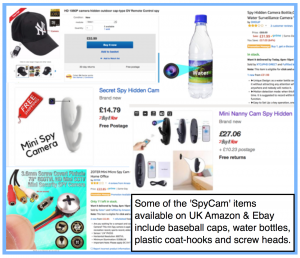
So, where does all this leave us? Potential forthcoming changes to the Gender Recognition Act would make it even easier for men to access women’s spaces. Any man- ANY man- will be able to simply self-identify as a woman and have as much legal right to be in a woman’s bathroom as in the men’s.
Some might claim that if public bathrooms are changed to unisex, at least we aren’t pretending women have the right to female-bodied spaces any more. To be honest, that’s the only upside I can see.
*****
Postscript: changes to the Gender Recognition Act
Concerned about potential forthcoming changes to the Gender Recognition Act? You should be! The new system would leave itself horrendously open to abuse. Laws that were slipped through years ago without public consultation mean that already a birth certificate is the only document that can’t be changed on a whim. Our right to women-only spaces is slipping through our fingers. To campaign for women’s rights is now widely viewed as transphobic. This has to stop.
We have just one chance to have our say in the government consultation which ends next month on 19th October 2018. If you haven’t already, I urge you to take part.
Fair Play for Women have some excellent information on their website here, and their free online booklet can talk you through the questions in the GRA consultation, explaining just what the government are asking and what the potential changes may mean. You can also get involved in spreading the word yourself. Act now, while you can. This really could be our last chance to protect female-bodied spaces.

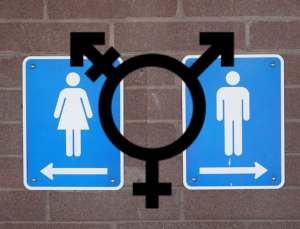
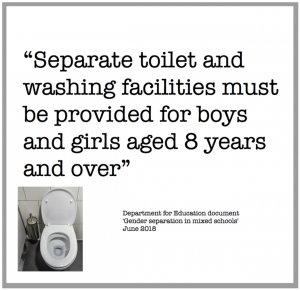 While the popularity of ‘gender neutral’ toilets is growing, by law single sex toilets must be provided for children in school over the age of eight. As recently as June 2018 the Department for Education document
While the popularity of ‘gender neutral’ toilets is growing, by law single sex toilets must be provided for children in school over the age of eight. As recently as June 2018 the Department for Education document 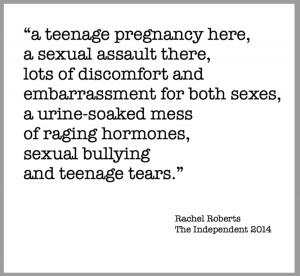 In 2014, The Independent ran an article entitled ‘
In 2014, The Independent ran an article entitled ‘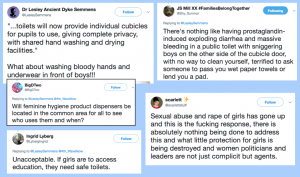
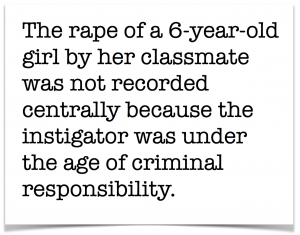 In 2017 TES
In 2017 TES 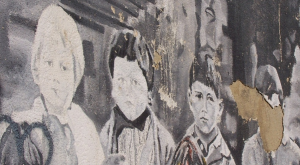
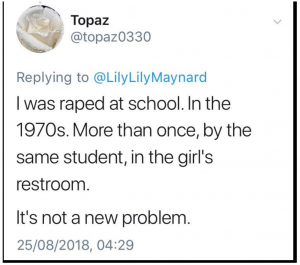 Sexual violence in schools is nothing new, but most of us assume that growing public awareness means that girls nowadays are more likely to report it and more likely to feel they will be listened to if they do. This does not necessarily seem to be the case.
Sexual violence in schools is nothing new, but most of us assume that growing public awareness means that girls nowadays are more likely to report it and more likely to feel they will be listened to if they do. This does not necessarily seem to be the case.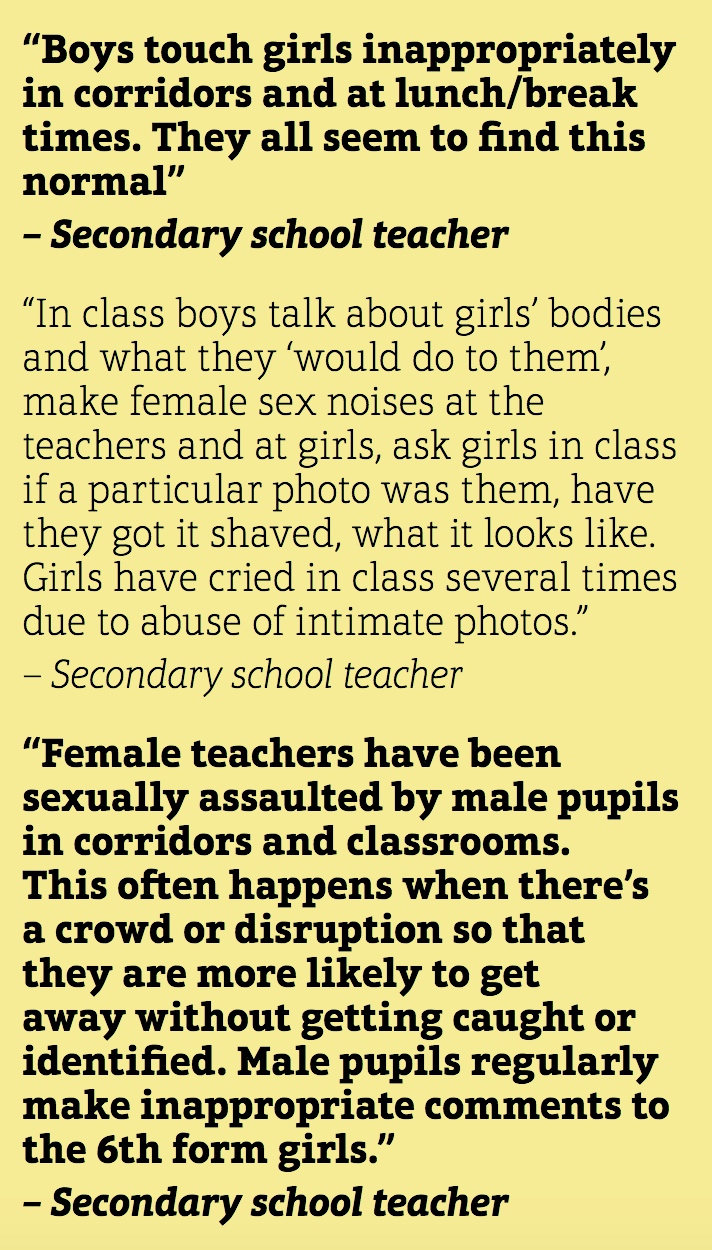 An investigation by the Press Association in 2017 revealed that children as young as five had been excluded from school for sexual misconduct. In 2017 the
An investigation by the Press Association in 2017 revealed that children as young as five had been excluded from school for sexual misconduct. In 2017 the 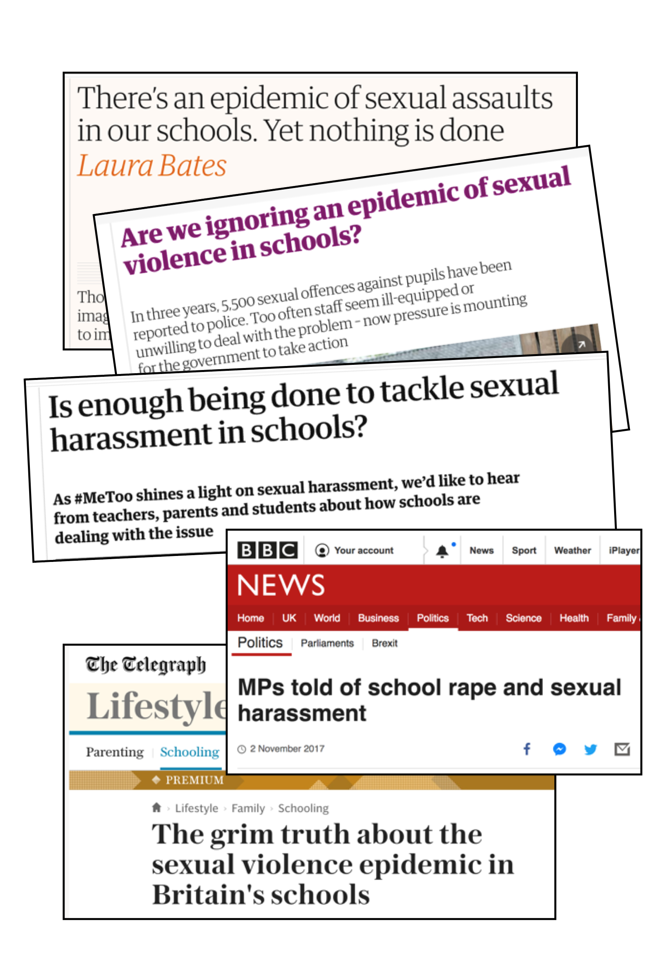 How gender neutral toilet and hand washing areas could help to minimise abuse, whether it’s one child calling another a ‘slut’ or a serious sexual assault, is a question which nobody seems to feel the need to answer.
How gender neutral toilet and hand washing areas could help to minimise abuse, whether it’s one child calling another a ‘slut’ or a serious sexual assault, is a question which nobody seems to feel the need to answer.